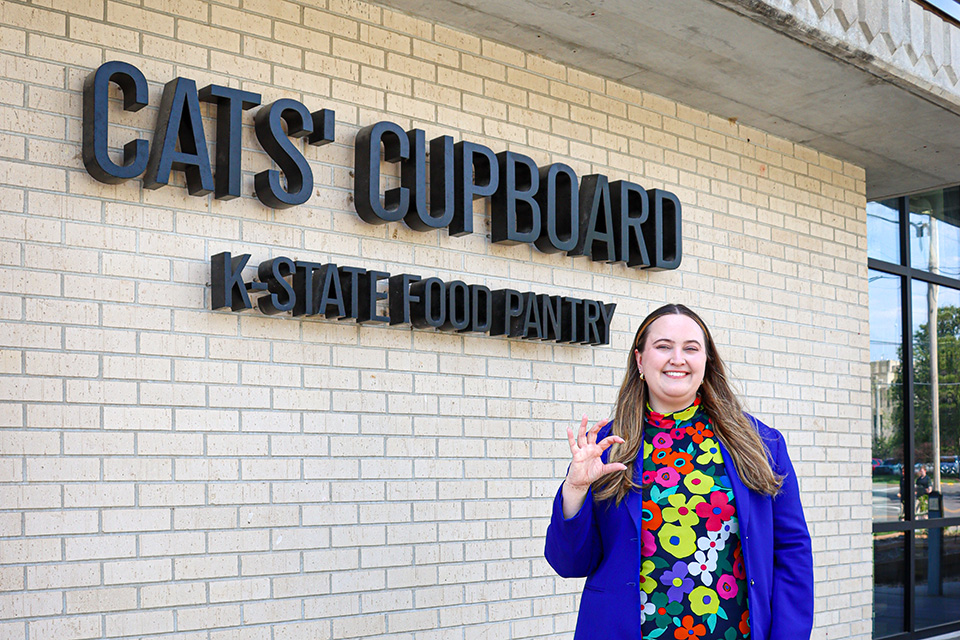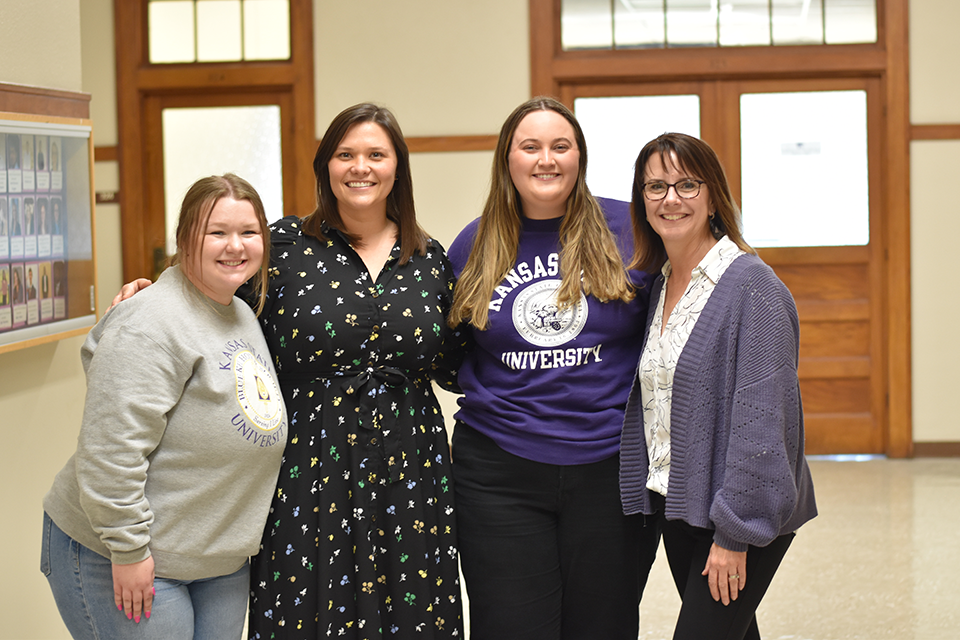Fueling change
Truman Scholar Adelaide Easter is focused on advocating for food security
etween balancing classes, leadership roles and advocacy work, Adelaide Easter has spent her college years making an impact at every level — on campus, in the community and beyond.
A fourth-year student at Kansas State University and recently selected Truman Scholar, her journey from a class project to shaping food policy proves that a packed schedule can fuel powerful change.
Easter is studying agricultural economics with a secondary major in global food systems leadership, in addition to pursuing minors in leadership and international agriculture. She also holds a non-profit leadership certificate.
Hailing from Salina, Kansas, Easter started her college journey in bakery science, inspired by her grandmother, a wedding cake decorator. However, a pivotal moment during her Introduction to Leadership Concepts course that included a service project with Cats’ Cupboard, changed her focus to food security and agricultural economics.
“I learned that 40% of students are food insecure on campus, and that just really stuck with me,” Easter says.

Adelaide Easter stands outside Cats' Cupboard, K-State's on-campus food pantry.
Servant leader
This experience led her to engage in the Global Food Systems Leadership Program and Food Security Scholars, ultimately steering her toward agricultural economics.
“Instead of making the food that you see on the grocery store shelves, I wanted to make sure that people had access to them,” Easter says.
It was understanding the broader economic factors affecting food security and poverty that motivated Easter’s academic transition, reinforcing her commitment to addressing these issues.
As part of her personal mission, Easter founded the Student Basic Needs Coalition, which aims to address food insecurity among students. Recognizing that food insecurity is a widespread but often overlooked issue, she saw an opportunity to make a tangible impact.
“One in three college students are eligible to apply for the Supplemental Nutrition Assistance Program, but most of them don’t know that,”
she says.
Determined to bridge this gap, she led efforts to raise awareness and streamline access to benefits.
“We had over 800 students fill out the screener to find out if they were eligible, and just over half of them were eligible to apply,” she says.
The result was transformative, Easter says, not just for individual students, but for the broader
campus community.
“That unlocked more than $110,000 in SNAP benefits,” she says.
Her impact on campus extends to student government, where she has served as basic needs director for two years. She played a role in securing funding for Cats’ Cupboard through the student services fee, providing the campus food pantry with its first-ever stable source of income.
“It’s huge,” Easter says. “There haven’t been many entities added to the student services fee lately — especially without the fee increasing in price. It’s something that I’m really proud of.”
Along with founding the Student Basic Needs Collation, she served as the director of leadership programming for Blue Key Senior Honorary; the director of stakeholders and public relations for Food Security Scholars; and student coordinator the Global Food Systems Leadership Program.
“Getting a variety of experiences has been so valuable,” Easter says. “Being involved with Blue Key, Food Security Scholars, and Global Food Systems Leadership has helped me grow as a leader and really understand how to work with others to drive change.”
Answering the call
Those leadership experiences, Easter believes, helped her secure a $30,000 Truman Scholarship for her graduate studies. She was one of only 60 recipients in the country in 2024.
“It’s really just about joining the community of other people that are just as dedicated to serving others and want to have a life or career in public service,” Easter says.
After her May 2025 graduation, she will join the Truman Summer Institute in Washington, D.C., living at George Washington University while interning with the nonprofit, Spur Local, and afterward hopes to start her career in food and agricultural policy. Her long-term goal is to work in D.C. for a few years before returning to graduate school.
“I want to get a little bit of work experience before going because I don’t know exactly what I want to study yet, but eventually I will go back to grad school,” Easter says.
She credits the College of Agriculture at K-State for providing her with transformative opportunities. She participated in the Flinchbaugh Food and Agriculture Policy Fellowship, which allowed her to gain policy experience at both state and national levels.
“I learned so much about food and ag policy and food security issues, and that is what really showed me that I wanted to eventually work in food and ag policy,” Easter says.
As Easter starts her next chapter, she appreciates her time at K-State.
“K-State has given me both inside and outside of the classroom opportunities that I am so grateful for,” Easter says. “Without those opportunities many of my experiences and honors would
be impossible.”
Becoming a Truman Scholar
The Harry S. Truman Scholarship, a prestigious national award for students aspiring for careers in public service, became a defining achievement in Adelaide Easter’s college journey, she says. The application process was rigorous, beginning with securing a campus nomination.
“Once I was a campus nominee, I worked on my application for over six months before I officially submitted it to the national level,” Adelaide Easter says.
From 709 applicants across 285 institutions, Easter advanced to the final interview stage at the Kansas City Federal Reserve. Facing a panel of Truman Scholars and the executive secretary of the Truman Foundation, she found herself as Kansas’s Truman Scholar.

From left to right: former Truman Scholars Hattie Polson and Dena Bunnel, Adelaide Easter and Staley School of Leadership Dean Mary Tolar.
Her reaction to the announcement of the award was one of sheer disbelief.
“I was actually in my Data Analysis and Optimization class, and we were wrapping up for the day,” Easter says. Then the door to the class opens, and President Richard Linton, fellow Truman Scholars, Dean Mary Tolar from the Staley School of Leadership and Dena Bunnel, Mary Kay Seifers — who’s a great adviser for me — and Beth Powers — who helped me through the entire process for the Truman Scholarship — all came in and told me that I received the scholarship; I was in a state of shock.”
Beyond the financial support of $30,000 for graduate school, the scholarship connected her with a network of passionate individuals dedicated to public service.
“For me, it’s honestly the people and the connections that I’m going to have from this that I think are more valuable than the money itself,” she says.
She has already participated in Truman Scholar Leadership Week and engaged in collaborative projects with fellow scholars.
Easter says, “It’s a great affirmation for me, for the work that I’ve been doing since coming to K-State and the work that I want to continue doing.”
This story was originally published in the fall 2025 edition of the Kansas State Agriculturist, a student-produced publication of the College of Agriculture.
###
